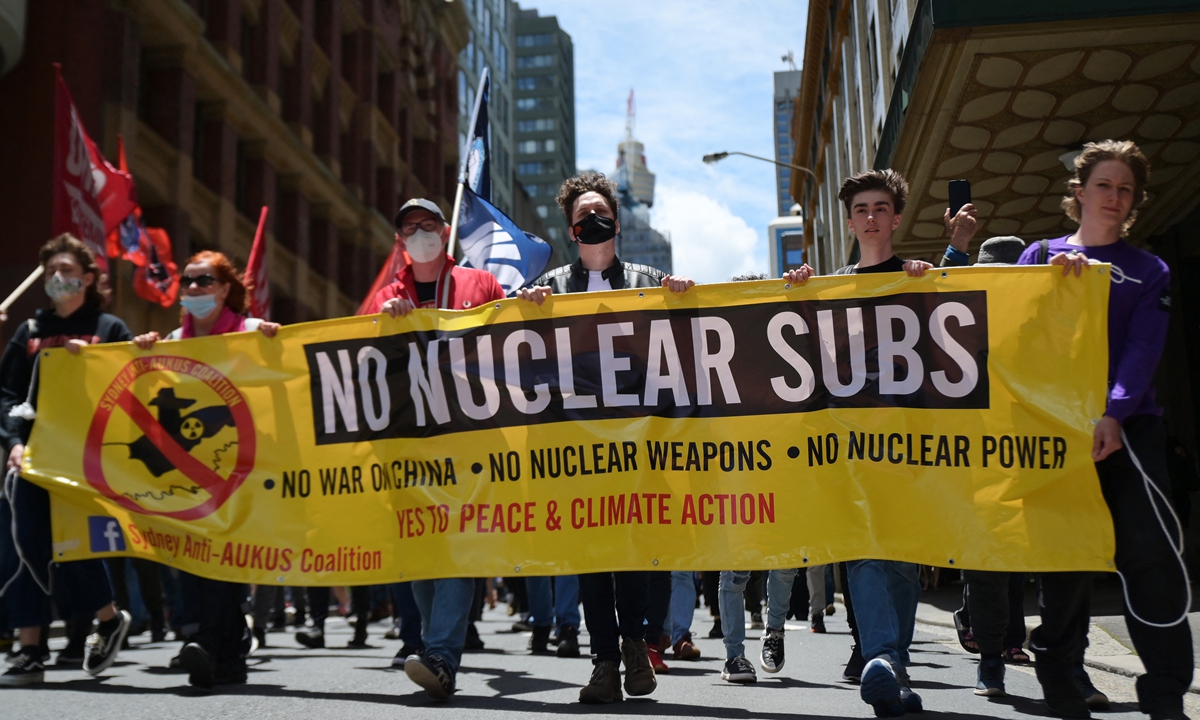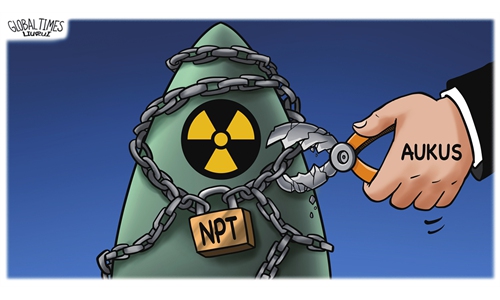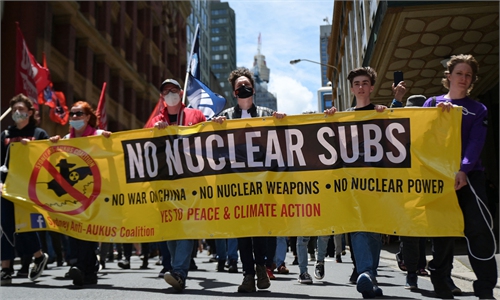Canberra urged not to risk national interests to serve Washington over possible submarine deal

Members of the Sydney Anti-AUKUS Coalition (SAAC) participate in a protest in Sydney, Australia, on December 11, 2021 against the nuclear submarines deal among AUKUS members. Photo: AFP
With the latest updates of Australia's possible purchases of five US Virgina class nuclear powered submarines being revealed by Western media in advance of the AUKUS meeting in the US, Chinese observers urged Canberra not to blindly follow Washington's strategy in containing Beijing, and risk its own national interests on economy and security only to serve Washington's interests.
Reuters reported on Wednesday that Australia is expected to buy up to five US Virginia class nuclear powered submarines in the 2030s as part of a landmark defense agreement between Washington, Canberra and London, citing four US officials, saying this is "in a deal that would present a new challenge to China."
The agreement, known as the AUKUS pact, will have multiple stages with at least one US submarine visiting Australian ports in the coming years and end in the late 2030s with a new class of submarines being built with British designs and American technology, according to the report.
The updates on AUKUS pact were revealed before next Monday's meeting which will be hosted by the US President Joe Biden and attended by leaders of Australia and the UK in San Diego to "chart a way forward for provision of the nuclear-powered submarines and other high-tech weaponry to Australia," Reuters noted.
The AUKUS pact is seeking to target China including on the Taiwan question and the South China Sea issues.
Commenting on the updates, Mao Ning, spokesperson for the Chinese Foreign Ministry, said at a press conference on Thursday that China believes that the trilateral cooperation (AUKUS) poses serious nuclear proliferation risks, impacts the international nuclear non-proliferation regime, stimulates arms race and undermines peace and stability in the Asia-Pacific region, which is widely questioned and opposed by countries in the region and the international community.
The Chinese spokesperson urged the US, the UK and Australia to abandon the Cold War mentality and zero-sum game, faithfully fulfill their international obligations and do more to contribute to regional peace and stability.
Since the initial AUKUS deal announced in 2021 under the then Australia's Morrison administration of Liberal Party, former Australian prime ministers Paul Keating and Malcolm Turnbull have argued that AUKUS will make Australia too dependent on the US at a time the nation should be becoming more self-reliant, according to the Sydney Morning Herald in February.
Keating, the Australian Labor legend, in September 2021 said that the partnership would produce "a further dramatic loss of Australian sovereignty" and continued his criticism in October, 2022 adding that it would be a "tragedy for Australia" if Labor followed through with the deal.
The US is pushing Australia to the forefront in the zero-sum game against China in a bid to serve its own interests, Chen Hong, president of the Chinese Association of Australian Studies and director of the Australian Studies Centre at East China Normal University, told the Global Times on Thursday.
If the purchase of nuclear powered submarines and other new development of the AUKUS pact are officially announced after the next Monday's meeting, Australia would take a dangerous step on the road to nuclear attack possession, which will pose big threat to the peace and stability in the Asia-Pacific region, Chen warned.
Given that the US-led AUKUS is military adventurist, Chen urged Australia not to be a pawn of the US, investing a lot for the US anti-China strategy, putting itself in a dangerous position, risking its own national interests but in the end very possibly gaining nothing.
According to Australian media, the deal, which could cost A$170 billion ($183 billion), would push Australia's defense spending to 2.5 percent of GDP. Australia is very likely to become the seventh nation with nuclear submarines
Such a huge investment would leave Australia with a heavy burden, experts said. Blindly following the US "Indo-Pacific strategy" and developing a nuclear-powered submarine base would pose a threat to other countries' security, they said, noting that the greatest security for Australia is "not taking sides between China and the US".
AUKUS is a small clique serving US strategic interests. When the US confrontation with China escalates, Washington will definitely keep up the pressure on its allies and partners, Chen said.
The recently improved ties between China and Australia have helped Australia recover its economy in the post-pandemic era. China and Australia trade amounted to 259.7 billion yuan ($37.47 billion) in January and February, with both imports and exports achieving double-digit growth year-on-year, data from China's General Administration of Customs shows on Tuesday.
Albanese has also repeatedly stressed the importance of ties with China, but the US anti-China strategy has always be a timebomb to the China-Australia ties, observers noted.
It is time for the Albanese administration to adopt its political wisdom and avoid being coerced by the domestic anti-China forces, blindly following the US and confronting China, Chen said.



